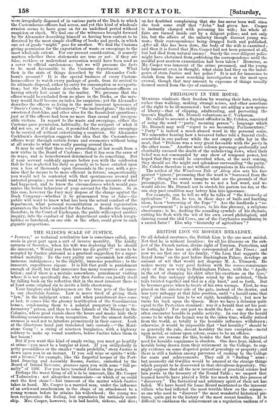PHILOLOGY IN THE HOUSE.
MEMBERS vindicate their freedom by wearing their hats, rushing rather than walking, making strange noises, and other assertions of the right to be ill-mannered ; but they are adding a new species of liberty—that of clipping, adulterating, and perverting the Queen's English. Mr. Disraeli volunteers as C. Verborum.
Ile called to account a flagrant offender in Mr. Cobden, convicted of using the word "'party,' meaning person" ; language which Mr. Disraeli may well "regret to see becoming Parliamentary." " Party " is indeed a much-abused word in the personal sense. We remember hearing how a bereaved father told a funeral circle, assembled in one parlour while the not empty coffin lay in the next, that "Dickens was a very great favourite with the party in the other room." Another more solemn personage profoundly and charitably excused the doubt of the unbelieving Jews, when their belief was not commanded by any show of temporal power, but hoped that they would be converted when, at the next coming, they should see the might and splendour surrounding "the party.' Mr. Cobden therefore is not without companions in his condition. The author of the Wondrous Tale of Alroy also sets his face against "ignore," presuming that the word is "borrowed from the Pope " ; though we cannot imagine what are the grounds of that presumption. The word seems to us not a bad word, and we would advise Mr. Disraeli not to stretch his purism too far, or the one step past erudition may betray him into ignorance.
For example, can he tell us why he talks of "the hierarchy of agriculture " ? Has he too, in these days of bulls and hurtling ideas, been "borrowing of the Pope " ? Are the landlords a "sa- cred government " ; is agriculture, to his fine phrensy, a religions • observance; is he, dashing the sounding cymbals of his rhetoric, cutting his flesh with the wit of his own sword philological, and dancing round the idol Ceres, one of the Corybantes maddening in a sacred furor ? Else why "hierarchy of agriculture " ?


























 Previous page
Previous page